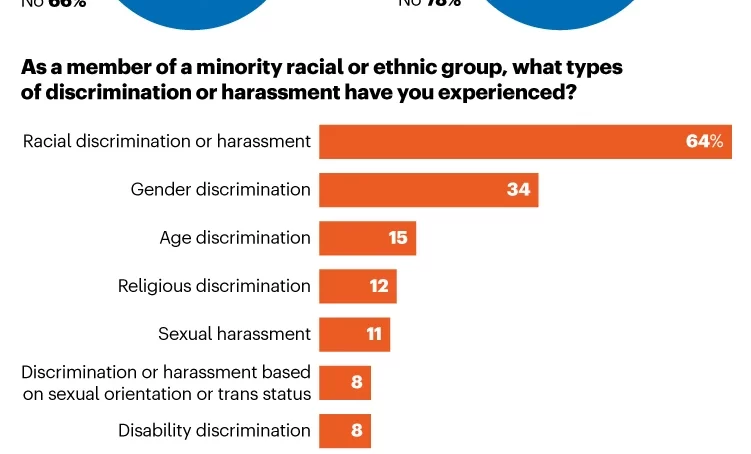
Science is often portrayed as a meritocracy in which one’s ideas and abilities matter more than anything else.
But Nature’s 2022 survey of PhD and master’s students points to an unpleasant reality: those who identify as members of minority ethnic groups face a greater share of discrimination and indignities than do students who aren’t in those groups.
The survey drew 3,253 self-selected responses from around the world. Twenty-one per cent of respondents identify as members of minority racial or ethnic groups in the countries where they currently live. Through survey responses and free-text comments, they describe mistreatment and struggles that go beyond the typical challenges of graduate school – from structural racism in institutions to microaggressions committed by peers.
Nature’s previous surveys polled respondents about their experiences of discrimination and bias. This year’s survey was the first to examine those experiences more deeply.
This is the sixth and final article linked to Nature’s global survey of graduate students in 2022. Previously published articles about the survey include explorations of master’s students’ satisfaction levels; career prospects and mobility issues for all respondents; and other aspects of graduate-student life worldwide.
The survey was created with Shift Learning, a market-research company in London, and was advertised on nature.com, in Springer Nature digital products and through e-mail campaigns. It was offered in English, Mandarin Chinese, Spanish, French and Portuguese.
Some 35 per cent of respondents from minority racial or ethnic groups say that they have experienced discrimination or harassment during their current programme. That’s more than twice the rate reported by respondents who do not identify as members of those groups (15 per cent).
“The sheer amount of sexism and racism that I’ve faced as I pursue my doctoral degree is beyond anything I could have imagined,” writes a PhD student in the United States. Moreover, 26 per cent of students from under-represented groups and 15 per cent of students who are not from such groups say that they have experienced bullying during their programme.
A vocal group of respondents shared their personal experiences of racism in the survey’s free-text section. A master’s student in the United States wrote: “Supervisors do not care about how their trainees face racism, homophobia, sexism and other barriers, but will pretend they do by using pronouns and rainbow flags.
A PhD student in Germany commented, “My supervisor was racist towards me and made my life a living hell.” She went on to say that when she reported the behaviour to her institution, she was told that administrators were already aware of issues with that particular supervisor.
When asked what they wish they had known before starting graduate school, a master’s student from Africa studying in China wrote, “I wish l had known how racist and abusive the dean and management are.” A PhD student in the United States said, “I wish I’d known how prevalent and ‘normal’ racism and sexism is in academia. I probably would have angered less people and had a better strategy of survival if I knew this culture was the norm.”
Another PhD student in the United States wrote that racist comments and attitudes can “take a toll on mental health”.
In the survey, students from under-represented groups are more likely, at 38 per cent, to report receiving help for depression or anxiety caused by their graduate studies than are students who are not from those groups (32 per cent).
Lala, whose father is from India, has for decades used the anglicised surname Laland. Lala now uses his father’s actual surname in a nod to his heritage.
“In the UK, there have been trends for the worse, not for the better, in recent years,” he says. “Many of our undergraduate and graduate students have experienced racial harassment.”
Lala, who discussed racism in academia in a Nature column in 2020, says that racist slurs and other overt acts tend to be more common off campus than in university labs and classrooms.
“Universities are relatively benign environments compared with the rest of the world,” he says. Despite this, he says, racism remains deeply woven into academia and institutions, especially when it comes to hiring, promotion and student retention.
According to the US National Science Foundation, members of minority ethnic and racial groups held less than 10 per cent of doctorate-level positions in science, engineering and health in 2019, despite comprising more than 30 per cent of the US population.
Similarly, a UK Royal Society report estimates that Black scholars accounted for 1.7 per cent of all academic positions in science, technology, engineering and mathematics in the United Kingdom in 2019, although the Black population in England and Wales for that year was estimated by the Office for National Statistics at 3.5 per cent.
- A Nature report











